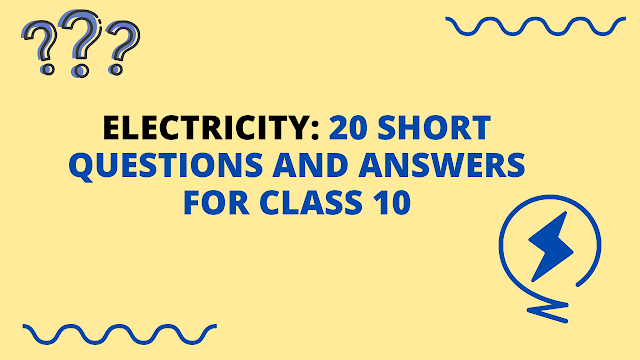ELECTRICITY: 20 SHORT QUESTIONS AND ANSWERS FOR CLASS 10
Electricity is a fundamental part of our daily lives and is used in a wide variety of applications, from powering homes and businesses to running transportation systems and manufacturing facilities. Understanding the basic concepts of electricity, including electric current, voltage, and resistance, is essential for understanding how electrical systems work and for troubleshooting problems that may arise.
Here, we are providing you the 20 short important questions about electricity,
1. What is electricity?
Electricity is the flow of electrical energy or charges through a material.
2. What is Electric Current?
The flow of electric charge through a conductor is known as electric current.
3. What is Voltage?
Voltage, also known as electric potential difference, is a measure of the electric potential energy per unit charge in an electrical circuit.
4. What is Resistance?
Resistance is a measure of the opposition to current flow in an electrical circuit.
5. What is Electric Circuit?
An electric circuit is a closed loop through which electric current can flow.
6. What is a cell?
A cell is a device that converts chemical energy into electrical energy.
7. What is a battery?
A battery is a group of cells connected together to provide a higher voltage.
8. What is a conductor?
A conductor is a material that allows electric current to flow through it easily.
9. What is an insulator?
An insulator is a material that does not allow the electric current to flow through it easily.
10. What is a switch?
A switch is a device that can open or close an electric circuit.
11. What is a bulb?
A bulb is a device that converts electrical energy into light energy.
12. What is an electric motor?
An electric motor is a device that converts electrical energy into mechanical energy.
13. What is an electric generator?
An electric generator is a device that converts mechanical energy into electrical energy.
14. What is an electric transformer?
An electric transformer is a device that changes the voltage of an alternating current.
15. What are the uses of electricity?
Electricity is used for lighting, heating, powering machines and appliances, transportation, and many other applications.
16. How does a simple electric circuit work?
A simple electric circuit includes a power source, such as a battery, wires to conduct the current, and a device, such as a light bulb, that uses electrical energy.
17. How does an electric cell work?
An electric cell works by a chemical reaction between two electrodes (anode & cathode) that generate an electric current through an electrolyte solution.
18. How does an electric motor work?
An electric motor works by using an alternating current to create a magnetic field that rotates a shaft and converts electrical energy into mechanical energy.
19. How does an electric generator work?
An electric generator works by using a mechanical force to rotate a shaft and magnets that generate an electric current through the coil wire, thus converting mechanical energy into electrical energy.
20. What are the dangers of electricity?
Electricity can be dangerous if proper safety precautions are not taken, such as the risk of electric shock, electrocution, fires, and explosions. It's always important to make sure electric equipment and wiring are in good condition and to follow safety guidelines when working with electricity.
Best of luck for your upcoming examination on electricity. The 20 questions and answers of the Electricity chapter provided in this article should have given you a good foundation to understand the basic concepts of electricity. It's always a good idea to practice as much as you can before an examination, so I would encourage you to use these questions as a starting point to study and practice more. Remember, practice makes perfect. And even if you not facing an exam, Congratulations on your effort of learning 20 important questions on electricity, continue to learn more and explore the subject more in-depth, this will help you to be more aware of the subject and its application in day-to-day life.
Thank You! for reading this Electricity Questions and Answers for Class 10


Comments
Post a Comment
Please, do not enter any spam links in the comment box.